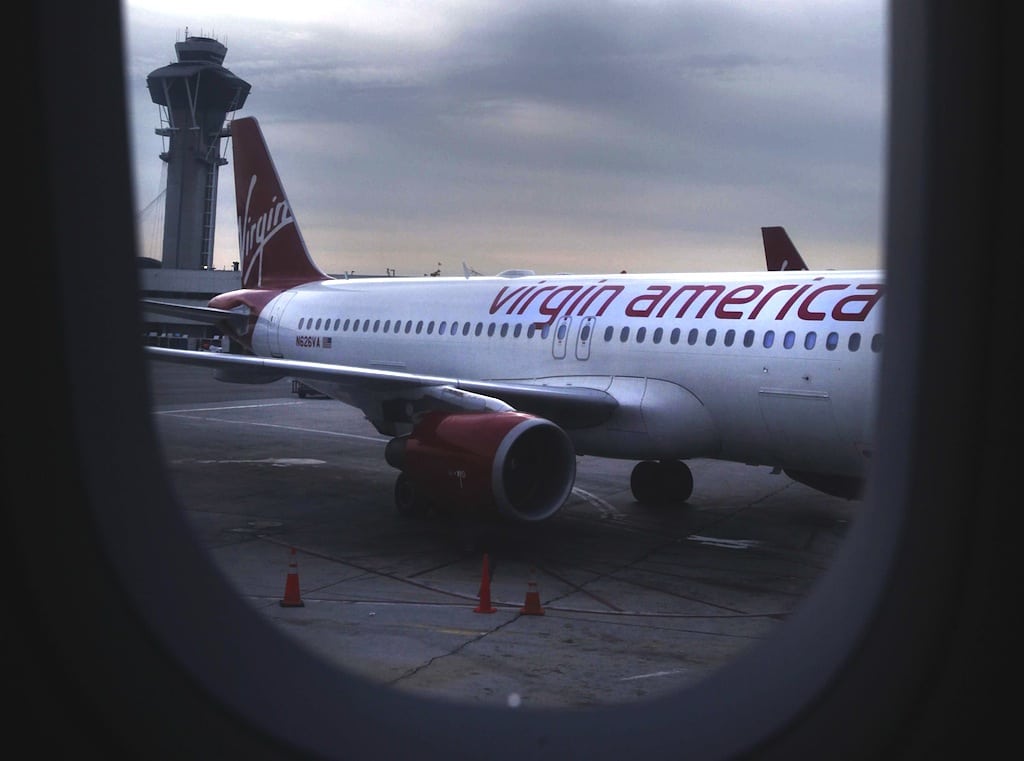Virgin America slows expansion plans and cuts Airbus order by two thirds

Skift Take
Virgin America Inc., the low-fare airline partly owned by Richard Branson, will cut an order for Airbus SAS jets by two-thirds and delay the delivery dates of newer models as it curbs expansion plans.
The carrier will now take delivery of 10 Airbus A320 planes, down from its original order for 30, in 2015 and 2016, according to a statement today. Those 10 aircraft are the last of the original batch, as the first 20 were to be handed over to the Burlingame, California-based airline from 2013 through 2015.
Virgin America also deferred the delivery range for 30 A320neo-model jets to 2020 through 2022 from the original dates of 2016 through 2019. The moves followed last month’s disclosure of a capacity reduction from January through March, the first cut in available seats since the airline started flying in 2007.
“During the summer we started looking at whether it still made sense to grow as fast as we were planning on, given fuel prices and what I’ll say is a modest economic growth climate in the U.S.,” Chief Executive Officer David Cush said in a telephone interview. “You don’t invest the capital if you can’t earn an adequate return.” There were no financial penalties associated with the cancellation, he said.
Virgin America projected annual growth in available seat miles to be a mid-single-digit percentage for the “next several years,” down from the 28 percent rate of the past three years.
The airline now flies 52 single-aisle A320s. The A320neo model is Airbus’s latest variant of the plane and is due to enter service in late 2015. Carriers typically buy at a discount to list prices, which are $88.3 million for the A320 and $96.7 million for the neo, according to Airbus.
Wider loss
Virgin America also reported that its third-quarter net loss widened to $12.6 million from $3.3 million a year earlier. Revenue jumped 27 percent to $368 million. The closely held company ended the period with $75 million in unrestricted cash.
“That’s a sign of rapid expansion, and you can expand yourself into oblivion,” George Hamlin, president of Hamlin Transportation Consulting in Fairfax, Virginia, said in an interview. “If you’ve been around for five years and you’re still losing money at a time when a lot of other carriers are reporting improved results, it suggests you might not be able to make that up in volume.”
Capacity trimmed
Capacity will be trimmed by about 3 percent in the first quarter to cut costs, Cush told employees in an October memo in which he also offered voluntary short-term leave to employees.
A surplus of employees took the voluntary leave offer for the first quarter and will return to work in April, Cush said in the interview. He declined to specify the number of employees.
The company sought voluntary reductions through short-term leave and flex scheduling because of an anticipated drop in traffic in the first three months of 2013, Cush wrote earlier in a letter to employees. The company has about 2,400 employees, according to today’s statement.
Virgin America will eliminate some flights that are traditionally unprofitable during the first three months of the year such as overnight and midweek flights, and will restore that service in April when demand typically improves, Cush said.
Large markets
The airline doesn’t plan to drop any cities, though it will reduce the number of departures in cities including Boston, Cush said in the interview. Virgin America flies to cities including San Francisco, Los Angeles, Las Vegas, New York’s John F. Kennedy airport and Boston.
“They went into large markets because of the traffic, but that also meant there were numerous other participants,” Hamlin said. “They had gotten to the party very late.”
Looking ahead to 2013, the airline expects capacity to be unchanged to slightly larger than in 2012, Cush said. Virgin America will end this year with capacity up 28 percent from 2011.
“The simple math out of that is we think we’re big enough right now for the time being,” Cush said. “The rapid growth we’ve had for the last few years is going to come to a stop.”
Virgin America may need to pursue a “major restructuring” to survive in the long term, according to Hunter Keay, an analyst at Wolfe Trahan & Co. in New York. Virgin America has competition on every route, such as San Francisco to New York. Each of the 11 other airlines Keay follows has a monopoly on at least 25 percent of their routes.
‘Network missteps’
“A combination of cash burn and network missteps into highly trafficked markets” is hurting Virgin America, Keay said in an October telephone interview. “They had an assumption that consumers would choose product quality over price and convenience, and network carriers responded with force.”
In an Oct. 17 note to clients, the analyst questioned Virgin America’s ability to survive and said its failure would benefit Alaska Air Group Inc. and JetBlue Airways Corp. the most.
Cush disagreed with Keay’s report, specifically the idea of a flawed business model and poor performance compared with Virgin America’s established competitors, he said.
Keay “came to the wrong conclusions,” Cush said. “We will prove that over time.”
With assistance from Mary Jane Credeur in Atlanta and Mary Schlangenstein in Dallas. Editors: Stephen West, Ed Dufner. To contact the reporter on this story: Victoria Stilwell in New York at [email protected]. To contact the editor responsible for this story: Ed Dufner at [email protected].
![]()




